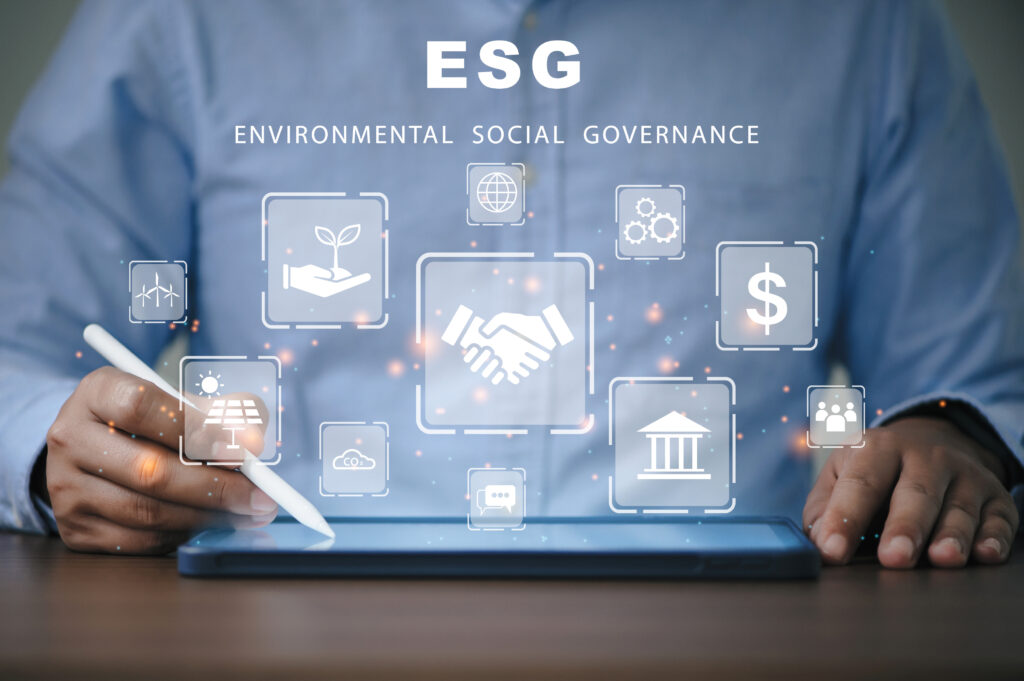Smart Buildings Blog
The latest on all things commercial building automation, energy management, and IoT
What is ESG?

ESG stands for Environmental, Social, and Governance. It is a framework used to evaluate and measure companies’ and organizations’ sustainability and ethical practices. ESG factors are considered beyond traditional financial metrics to assess an entity’s impact on the environment, society, and governance structure.
Here’s a breakdown of each component of ESG:
Environmental: The environmental aspect of ESG evaluates a company’s impact on the environment and its efforts to mitigate environmental risks. Focusing on factors such as:
- Sustainability and Long-Term Viability: Environmental concerns are closely tied to a company’s long-term viability and sustainability. By managing and minimizing its environmental impact, a company can reduce resource consumption, mitigate risks associated with climate change and resource scarcity, and ensure the availability of resources for future generations. Taking proactive measures to address environmental challenges helps protect the company’s operations, supply chain, and overall business continuity.
- Reputation and Stakeholder Expectations: Environmental responsibility has become a significant factor in shaping a company’s reputation. Customers, employees, investors, and other stakeholders increasingly demand companies demonstrate their commitment to environmental sustainability. Companies prioritizing ecological impact reduction and adopting sustainable practices tend to enhance their brand image, attract environmentally conscious customers, and strengthen stakeholder relationships.
- Cost Savings and Efficiency: Addressing environmental impact can lead to cost savings and operational efficiencies. Companies can lower operating costs and enhance their bottom line by improving energy efficiency, implementing waste reduction strategies, and optimizing resource use. Energy-efficient technologies, renewable energy adoption, and waste reduction initiatives can generate long-term cost savings and improve resource productivity.
- Competitive Advantage: Demonstrating a commitment to environmental responsibility can provide a competitive advantage in the marketplace. Customers increasingly make purchasing decisions based on a company’s sustainability practices, and businesses that prioritize environmental impact reduction can differentiate themselves from their competitors. Additionally, investors are increasingly considering ESG factors in their decision-making, and companies with strong environmental performance may attract more investment opportunities.
Ultimately, being concerned about its environmental impact is crucial for a company to ensure its long-term viability, maintain regulatory compliance, meet stakeholder expectations, enhance its reputation, drive cost savings, gain a competitive edge, and capitalize on innovation and market opportunities. By integrating environmental responsibility into its core business strategies, a company can create value, reduce risks, and contribute to a more sustainable future.
Social: The social aspect of ESG examines a company’s interactions with its stakeholders and society. Focusing on factors such as:
- Brand Image: Social impact directly influences a company’s reputation and brand image. How a company interacts with and contributes to society can significantly impact how it is perceived by customers, employees, investors, and other stakeholders. Positive social impacts, such as fostering community engagement, supporting social causes, and promoting ethical practices, can enhance a company’s reputation and brand loyalty.
- Customer Preferences and Loyalty: Consumers increasingly consider a company’s social impact when purchasing. They prefer to support businesses that align with their values and contribute positively to society. Companies that effectively demonstrate social responsibility and address social issues can attract and retain customers, foster customer loyalty, and differentiate themselves in a competitive marketplace.
- Employee Engagement and Retention: Employees, particularly the younger generation, are increasingly seeking purpose and meaning in their work. They are likely to be engaged and committed to a company that has a positive social impact. Companies prioritizing social responsibility can attract top talent, improve employee morale and satisfaction, enhance productivity, and reduce turnover rates.
- Stakeholder Expectations: Various stakeholders, including investors, communities, NGOs, and governmental organizations, have heightened expectations for companies to act responsibly and address social issues. Companies that ignore or neglect their social impact may face reputational risks, negative publicity, stakeholder activism, and potential legal and regulatory challenges.
- Access to Capital and Investment Opportunities: Investors increasingly consider social impact an essential criterion for investment decisions. Companies with solid social performance and sustainability practices may have better access to capital, attract socially responsible investment funds, and benefit from a broader range of investment opportunities. Integrating social impact into business strategies can enhance a company’s financial resilience and long-term growth prospects.
- Contributing to Social Progress: Companies can potentially drive positive social change by addressing societal challenges and making a meaningful impact. By aligning business practices with social goals, companies can contribute to issues such as poverty alleviation, education, healthcare, diversity and inclusion, human rights, and sustainable development. This benefits society and creates shared value and long-term business opportunities.
A company needs to be concerned about its social impact to protect and enhance its reputation, attract and retain customers and employees, meet stakeholder expectations, access capital and investment opportunities, maintain a social license to operate and contribute to positive social progress. By demonstrating social responsibility and making a positive social impact, companies can create value for themselves and society.
Governance: The governance aspect of ESG assesses the company’s governance structure, transparency, and ethical business practices. Focusing on factors such as:
- Transparency and Accountability: An effective governance structure ensures transparency and accountability within a company. Good governance practices promote openness in decision-making processes, financial reporting, and disclosure of relevant ESG information. Transparent governance helps build trust with stakeholders and ensures that the company’s ESG commitments are upheld.
- Risk Management: A robust governance structure helps identify, assess, and manage ESG-related risks. It ensures processes are in place to monitor and mitigate environmental, social, and governance risks. Effective risk management contributes to the company’s long-term sustainability by minimizing potential legal, reputational, and financial risks arising from ESG-related issues.
- Compliance and Legal Requirements: A robust governance structure ensures compliance with relevant laws, regulations, and industry standards related to ESG. It helps the company understand its obligations, implement necessary policies and procedures, and stay updated on evolving ESG requirements. Non-compliance with ESG regulations can lead to legal consequences, reputational damage, and operational disruptions.
- Stakeholder Engagement: Governance practices are crucial in engaging and communicating with stakeholders. An effective governance structure facilitates dialogue and collaboration with shareholders, employees, customers, communities, and other stakeholders. It allows for meaningful engagement on ESG matters, incorporating stakeholder perspectives and addressing their concerns and expectations.
- Ethical Conduct and Corporate Culture: Governance structure influences a company’s ethical conduct and corporate culture. It sets the tone at the top and establishes the standards of behavior and integrity. A well-defined governance framework promotes ethical practices, encourages responsible decision-making, and fosters a culture of integrity and compliance. Ethical behavior concerning ESG contributes to the company’s reputation and trustworthiness.
- Investor Confidence and Access to Capital: Investors increasingly consider the governance practices of companies when making investment decisions. A company with a strong governance structure and effective board oversight will likely attract more investment and gain investor confidence, including those focusing on ESG criteria. Robust governance practices enhance the company’s credibility, lower the perceived risk, and provide assurances to investors.
- Long-Term Performance and Value Creation: A sound governance structure contributes to long-term performance and value creation. It aligns the interests of the company’s management, board, and shareholders with the ESG goals and objectives. Effective governance practices help integrate ESG considerations into the company’s strategic decision-making processes, leading to sustainable growth, enhanced resilience, and improved financial performance.
A company needs to be concerned about its governance structure for ESG to foster transparency, accountability, risk management, compliance, stakeholder engagement, ethical conduct, investor confidence, and long-term performance. A strong governance framework provides the foundation for effectively addressing ESG issues, aligning business strategies with sustainability goals, and creating value for the company and its stakeholders.

Source: iStock
So, how can a company effectively rate itself in each ESG category using an ESG scorecard?
An ESG (Environmental, Social, and Governance) scorecard, also known as an ESG scorecard or ESG rating, is a tool used to assess and measure the performance of companies or organizations concerning environmental, social, and governance factors. ESG scorecards provide a quantitative or qualitative evaluation of an entity’s sustainability practices, ethical conduct, and corporate governance. Rating agencies, research firms, or specialized organizations typically develop them, gather data, evaluate performance indicators, and assign company scores or ratings. These scorecards can take various forms, such as numerical ratings, letter grades, or percentile rankings.
The purpose of an ESG scorecard is to provide investors, stakeholders, and the public with information to assess a company’s sustainability and ethical practices. It helps investors make informed decisions based on environmental, social, and governance considerations and encourages companies to improve their ESG performance over time.
It’s important to note that different rating agencies or organizations may have their methodologies and criteria for evaluating ESG factors, resulting in varying scores or ratings. Therefore, when interpreting ESG scorecards, it’s essential to understand the specific methods and context behind the ratings to make meaningful comparisons and assessments.
Overall, ESG is a holistic approach to evaluating the environmental, social, and governance impact of companies and organizations, considering a broader set of criteria beyond financial performance to drive sustainable and responsible practices.
The integration of ESG factors into investment decisions and corporate practices has gained significant momentum in recent years. Investors and stakeholders increasingly recognize that sustainable and responsible practices benefit society and the environment and lead to long-term value creation and risk mitigation. ESG considerations help investors identify companies with strong sustainability and ethical practices and enable them to align their investments with their values.
Various frameworks, standards, and rating systems exist to evaluate and measure ESG performance, including the Global Reporting Initiative (GRI), the Sustainability Accounting Standards Board (SASB), and the Principles for Responsible Investment (PRI). These frameworks provide guidelines for reporting ESG information and promote transparency and accountability in corporate practices.
Let FSG Smart Buildings help you with your business’ ESG goals. Contact us and find out how we can deliver success for your organization today.
Interested in building automation and helping customers build smarter buildings? Come work for us! FSG Smart Buildings is hiring talented people looking for a great career in building automation.
More from the Blog

What is Supply Air and Why is it Important to Monitor?
What is Supply Air and Why is it Important to Monitor?
In an HVAC (Heating, Ventilation, and Air Conditioning) system, the supply air refers to the conditioned air provided to occupied…

Implementing a Successful Energy Savings Program
Implementing a Successful Energy Savings Program
Commercial buildings significantly contribute to energy waste due to size, occupancy patterns, and energy-intensive operations. The amount of energy wasted…

